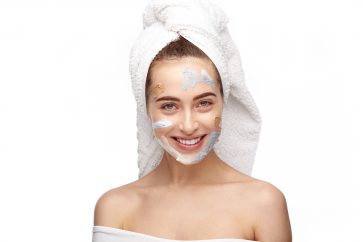What Is Isopropyl Myristate?
Isopropyl myristate is an ingredient that you may have unknowingly used many times before. Isopropyl myristate is a synthetic oil made from two components. The first component is isopropyl alcohol, the antimicrobial agent used in some hand sanitizers, baby wipes, and antiseptic formulations. The second component is myristic acid, which is a naturally occurring fatty acid often found in coconut oil, nutmeg, and animal fats such as butter—the two elements when they are combined form an exceptional emollient.
Emollients are thick, slightly waxy ingredients that help to maintain the skin’s natural barrier and provide the skin with that desired hydrated look. The skin’s natural barrier is the first few layers of skin and the protective oils that are produced, sebum. Disruption of the skin’s natural barrier has been linked to skin conditions such as eczema, so skin barrier health is vital to clear healthy-looking skin.
Isopropyl myristate has the added benefit of also enhancing the penetration of ingredients into the skin. This means that key ingredients in your skincare can penetrate deeply into the skin, working to improve the appearance of the skin.


Isopropyl Myristate
The good: Isopropyl myristate works as an emollient, helping to maintain the skin’s natural barrier and retain moisture. It also helps to increase the penetration of key ingredients in your product.
The not so good: Isopropyl myristate can be too heavy for congestive skin types and can increase the penetration of ingredients, potentially increasing the likelihood of a product clogging the skin.
Who is it for? Dry to normal skin types will benefit most from the moisture-locking abilities. Still, it is suitable for most skin types except those that have an identified allergy to it, or those that are actively trying to decongest their skin.
Synergetic ingredients: Works well with most ingredients.
Keep an eye on: As isopropyl myristate helps ingredients to penetrate the skin, it is important, especially for sensitive skin types, that you assess the other ingredients in your product.
What Are The Benefits of Isopropyl Myristate?
Moisture retaining
Working as an emollient isopropyl myristate helps to maintain the integrity of the skin’s natural barrier. Products with isopropyl myristate help to create a protective coating on the surface of the skin. This helps to prevent moisture loss and limit the skin’s exposure to allergens and bacteria.
Absorption
Isopropyl myristate improves the absorption of other products into the skin. It is often used in medicated formulations so that the skin receives the medication effectively. This is an excellent characteristic when it comes to getting the most out of your skincare ingredients; however, it can be irritating to sensitive skin type or clogging to congested skin types.
Texture
Isopropyl myristate can help to improve the texture of the products. It helps to thicken the product, which enhances the feeling of the product on the skin as it is applied. In formulation, it prevents oil-based ingredients from feeling too greasy or heavy but creating an even emulsion.
Is Isopropyl Myristate Safe?
According to research conducted by the Cosmetic Ingredient Review Expert Panel, it is safe for its indicated use. However, isopropyl myristate can cause some sensitivity issues. In a case study published in the journal, Contact Dermatitis examined the potential for irritation to occur in sensitive skin types using isopropyl myristate products. They were able to identify that there is some sensitivity associated with the ingredient in some people, about 2%.
The other issue with isopropyl myristate is that it is considered to be comedogenic, meaning that it can create blockages of the pores. This can increase the visibility of pores and might contribute to the presence of blemishes. For this reason, it may be best to avoid products with high levels of isopropyl myristate if you have congested skin. There is a broad range of concentrations used in products with a range between 0.001-20%. Higher concentrations tend to be present in products such as foundations and heavy moisturizers; other products tend to utilize lower strength.
Other Uses:
Isopropyl myristate is sometimes used as an artificial flavor in food. It is also used in some head lice treatments as the waxy ingredient coats the lice and prevents them from sourcing water or food.
Other Names:
Isopropyl myristate can also be known as 1-methylethyl ester tetradecanoic acid, tetradecanoic acid, IPM, isopropyl ester myristic acid, isopropyl myristate, isopropyl tetradeconoate, myristic acid, isopropyl ester, 1-methylethyl tetradeconoate, 1-methylethyl ester, and tetradecanoic acid.
References: Brinkmann, I & Müller-Goymann, C, 2003. ‘Role of Isopropyl Myristate, Isopropyl Alcohol and a Combination of Both in Hydrocortisone Permeation across the Human Stratum corneum’. Skin Pharmacology and Physiology, vol. 16, pp. 393-404. Wen, Z, Fang, L & He, Z, 2008. ‘Effect of chemical enhancers on percutaneous absorption of daphnetin in isopropyl myristate vehicle across rat skin in vitro’, Drug Delivery, pp. 214-223 Cosmetic Ingredient Review, 1982. ‘Final Report on the Safety Assessment of Myristyl Myristate and Isopropyl Myristate’, CIR. Tong, P & Chow, E, 2017. ‘Isopropyl myristate contact allergy: could your moisturizer be the culprit’, Contact Dermatitis, vol. 77, is. 3.







